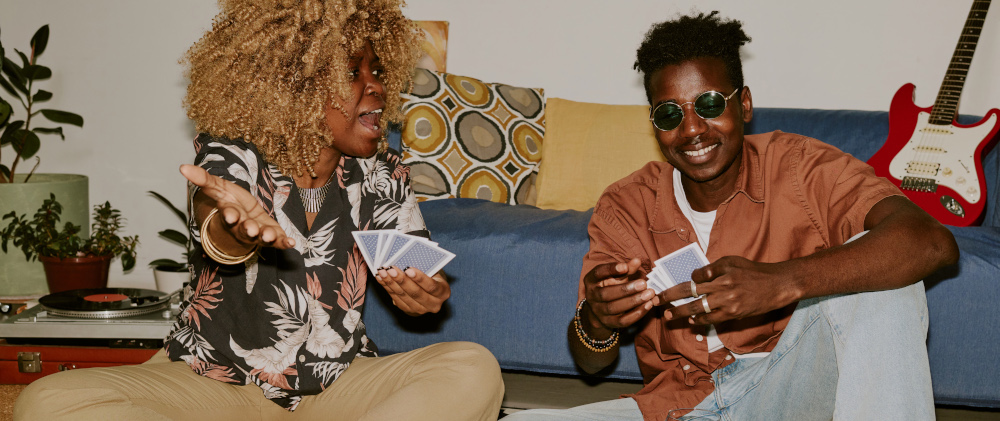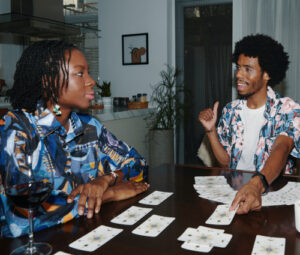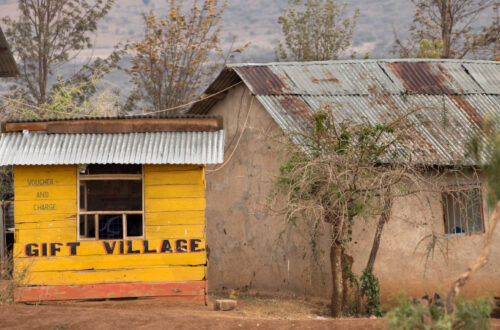
The Quiet Psychology of Card Games in South African Homes
Somewhere between a cup of Ricoffy and the sound of a slow ceiling fan, a deck of cards appears. It doesn’t matter whether you’re in a township, suburb, or dorp, the ritual is the same. The shuffle. The deal. The pause. Then someone raises an eyebrow, someone else sighs, and the game begins.
Card games in South Africa aren’t just games. They’re language. They’re history. They’re tension held together by brittle silence or rowdy laughter, depending on who’s playing. At first glance, they seem harmless, just cousins playing a lazy hand of Uno, gogo calling out 30 Seconds to Win in a home-stitched housecoat, or friends gathered under a carport battling in Casino. But if you sit with it a while, watch the hands more than the cards, something else becomes clear, this isn’t about winning. It’s about watching. Reading. Performing. Losing gracefully. Or not.
There’s an unspoken theatre in South African card games. A flick of the wrist, a twitch in the mouth, a stare that lingers too long. We learn to lie kindly in games like Rummy. We learn to challenge authority in games like Brag. We learn to wait in games like Solitaire. And all of this happens in places where emotions aren’t always given room to stretch out in the open.
Because in South Africa, especially in the spaces squeezed by survival, games are where people breathe. They sit around the table and take turns revealing parts of themselves, quietly, through luck and mischief. In the townships, playing cards are sometimes creased and sticky, passed down like soup recipes. In the suburbs, they might be crisp and themed, part of a weekend cabin trip or board game night. In rural homes, they could sit beside the salt on the kitchen shelf, ready to be taken down when the weather turns or the power cuts out. The point is, they’re there. Always. Waiting.
Ask anyone what they remember from their childhood, and somewhere, after the beatings, the school trips, the fake Santa at the mall, someone will mention cards. That one cousin who cheated. The uncle who always won. The moment you beat your older brother for the first time. Cards sit in the domestic archive like old VHS tapes, worn out, undervalued, but still able to rewind something powerful. And then there’s the way card games mark time.
You’ll find cards laid out at funerals, where mourning men try to distract themselves with order and logic. You’ll find them at weddings, when younger cousins huddle over a hand of Black Queen between speeches. You’ll find them during loadshedding, when the world goes dark and the only thing brighter than the candle is the glow of being fully present. Because playing cards, unlike phones or screens, demand your full self. Your attention. Your deceit. Your joy. They are not casual. They are confessions.
Of course, there’s always that cousin who takes it too seriously. The one who swears they could play professionally. The one who shuffles like a Vegas croupier and wears sunglasses indoors “for focus.” We laugh. But deep down, we know what that’s about too. It’s about control. About taking a game where the odds are stacked and believing, just for one afternoon, that you can beat the system.
 In this way, card games offer more than entertainment, they offer a tiny, flickering illusion of mastery. When so much around you feels unstable, politics, petrol prices, that neighbour’s dog, cards offer rules. Predictable, understandable rules. You play, you bluff, you fold. You win, or you don’t. But you try. You always try. And that, for many of us, is the closest thing to therapy we’ve ever known.
In this way, card games offer more than entertainment, they offer a tiny, flickering illusion of mastery. When so much around you feels unstable, politics, petrol prices, that neighbour’s dog, cards offer rules. Predictable, understandable rules. You play, you bluff, you fold. You win, or you don’t. But you try. You always try. And that, for many of us, is the closest thing to therapy we’ve ever known.
Even the way we speak about cards reflects this quiet emotional literacy. We say “He’s a joker” when someone masks pain with humour. We say “Don’t show your hand too soon” to teach our kids restraint. We talk about having “an ace up our sleeve,” even when we don’t play anymore. The metaphors bleed into our politics, our relationships, our stories.
And what about the jack? Ah, the jack. The in-between card. Not powerful like a queen or king. Not lowly like a two or three. Always close to power, but never quite seated in it. It’s the most South African of cards, really. Misunderstood. Underestimated. Resourceful. Sometimes dangerous. Always watching.
There are whispers that games like Poker and Blackjack are slowly fading in homes, replaced by screens and online distractions. But even now, when data runs out and TikTok gets boring, cards return. In flats where signal is poor. In villages where uncles still keep a weathered deck in their pocket. In city lounges where friends reconnect over Castle and cackles.
And while online betting might carry the flashy lights, real cards carry weight. Emotional weight. Memory weight. Legacy weight. There’s no autoplay here. No push notifications. Just eye contact and carefully stacked lies. And sometimes, a very real truth slips out with the joker. Maybe that’s why, no matter how digital we get, we never fully let go of the deck. Because cards don’t just entertain. They expose. They remind. They hold the soft, frayed corners of who we are, risk-takers, observers, survivors.
So next time someone pulls out a deck and asks if you’re keen, don’t just say yes. Watch the way they shuffle. Notice who wins. And listen, really listen, to what the jack might be saying.




